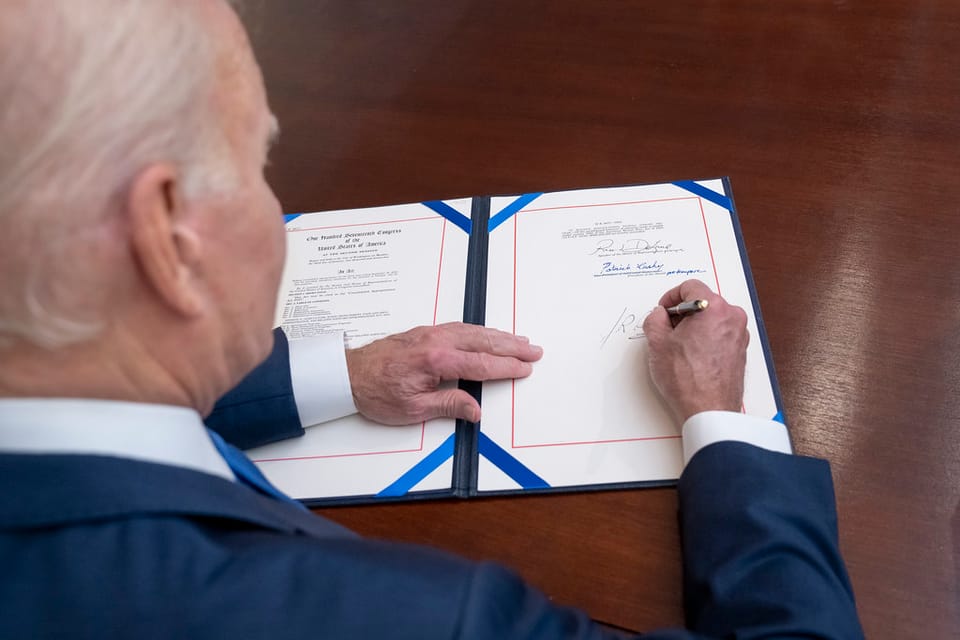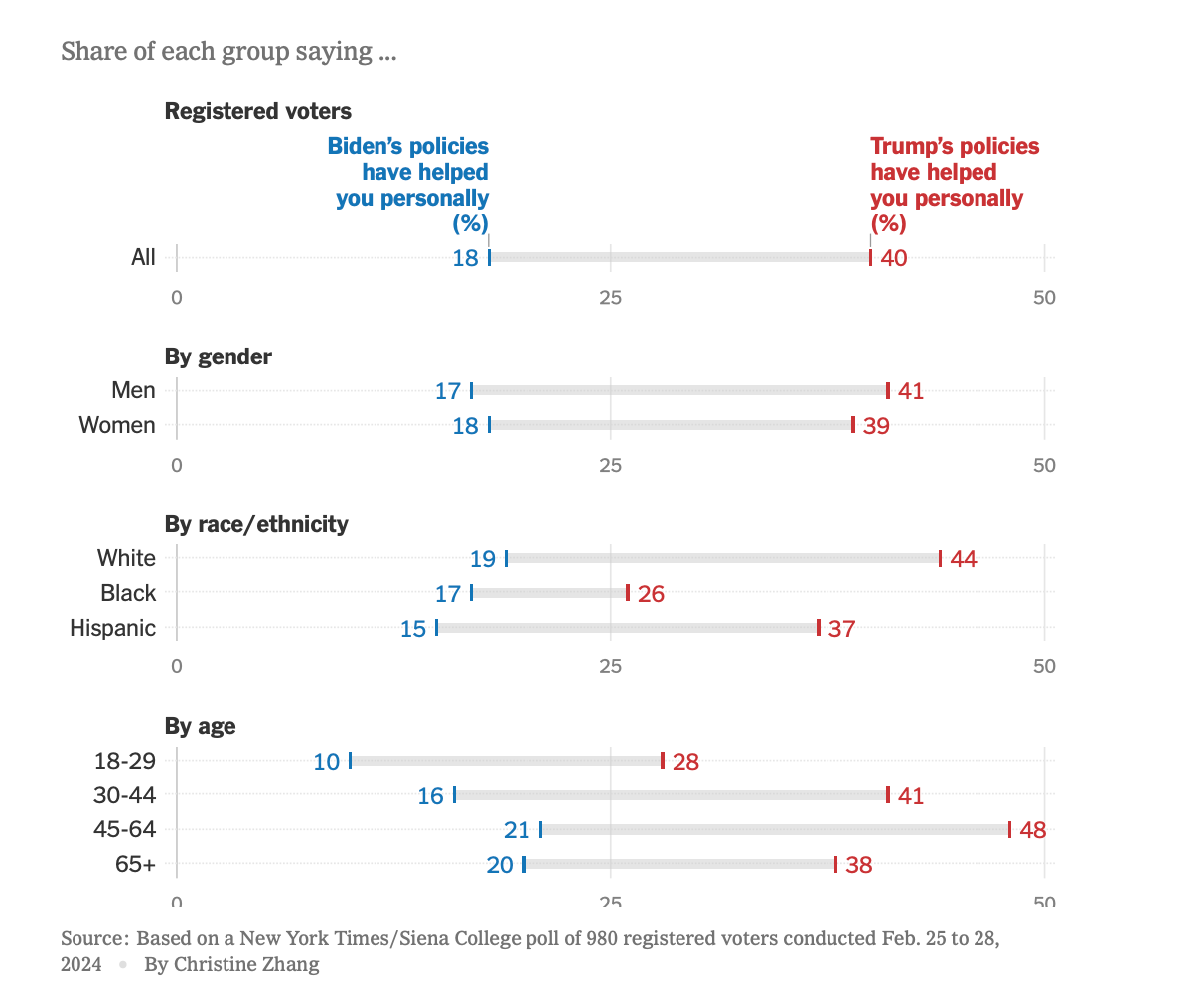Your guide to a blizzard of Biden actions

Good morning! It’s Friday, April 26, 2024. Election Day is 193 days away. If this newsletter was forwarded to you, subscribe here. If you want to contribute to support my work, donate here.
Usually, I kick off Friday’s newsletter by taking a look at what Congress got done in the previous week. But Congress was on recess for most of this week, so — except for a very consequential exception — there aren’t many legislative developments to report.
So, this morning, I’d like to instead turn your attention to the other side of Pennsylvania Avenue, where the Biden administration released a flurry of major regulations and executive actions. Regulatory moves may not sound terribly interesting, but, as I’ve written previously, a lot of American lawmaking is effectively done by regulation.
If you bear with me, I think you’ll find that many of these are poised to have a bigger impact than you might expect.
Non-compete clauses
What happened: The Federal Trade Commission voted 3-2 to finalize a regulation that will ban employers from implementing noncompete agreements, which prohibit workers from joining or creating competing companies for a certain period of time.
Legal basis: The Federal Trade Commission Act of 1914, which created the FTC, gives the agency the power to regulate “unfair methods of competition in or affecting commerce,” which the new rule defines to include noncompete agreements
Who it will affect: According to the FTC, 18% of American workers — about 30 million people — are currently covered by noncompetes. The agency estimates that the average worker will earn $524 more per year due to the regulation and that 8,500 new businesses will be created each year by workers without noncompetes hemming workers in. (Noncompete agreements for senior executives, who make up less than 1% of workers, will still be allowed.) The rule is expected to face significant legal challenges; the Chamber of Commerce has already filed a lawsuit to block it, calling the regulation an overreach of executive power.
Overtime pay
What happened: The Labor Department finalized a regulation that will make more workers eligible for overtime pay. Currently, most salaried employees who make less than $35,568 are legally required to receive overtime pay, at a rate of time-and-a-half. Under the new rule, starting in July, that requirement will be extended to workers who make up to $43,888; the threshold will then be lifted again to $58,656 in January 2025.
Legal basis: The Fair Labor Standards Act of 1938 allows the Labor Department to set the salary threshold at which employees who work over 40 hours a week are entitled to receive overtime.
Who it will affect: According to the Labor Department, the rule will make about 4 million more workers eligible for overtime. “In its first year, the rule is expected to result in an income transfer of about $1.5 billion from employers to workers, mainly from new overtime premiums or from pay raises to maintain the exempt status of some affected employees,” CNN reported. Business groups argue that the rule will be too costly for companies, lead to layoffs, and reduce workplace flexibility.
Airline refunds
What happened: The Transportation Department finalized a regulation that will require airlines to “promptly provide passengers with automatic cash refunds” when their flights are “cancelled or significantly changed, their checked bags are significantly delayed, or the ancillary services, like Wi-Fi, they purchased are not provided.” The agency also finalized a rule that will require airlines to disclose any added fees for checked bags, carry-on bags, or reservation changes before consumers purchase a ticket.
Legal basis: Both rules are derived from the department’s authority under 49 U.S.C. §41712 to “protect consumers from unfair or deceptive practices” by airlines.
Who it will affect: Anyone who buys a plane ticket from a U.S. airline or has their flight canceled or delayed by three hours (or six hours for an international flight). Currently, airlines are only required to offer refunds if they are at fault for the delay, and the refunds can be in the form of a voucher and sometimes have to be requested by the traveler. With the new rule, cash refunds will be required and the airlines will be mandated to proactively offer them without being requested.
Net neutrality
What happened: The Federal Communications Commission voted 3-2 to restore Obama-era regulations protecting net neutrality. The rules, which were rescinded during the Trump administration, prohibit providers from speeding up internet service for those willing to pay more and slowing service down for the rest.
Legal basis: Title II of the Communications Act of 1934 gives the FTC broad authority to regulate “common carriers,” a category that this rule defines internet providers as falling under.
Who it will affect: Under the new rules, broadband internet would be treated like a utility, facing the same regulations as phone and water companies and required to treat their customers equally. Theoretically, all internet users will be impacted — although it’s worth noting that in the years since the rules were repealed by Trump, there haven’t been many examples of companies meddling with internet service in the ways that net neutrality forbids.
The Biden administration also announced new regulations this week protecting reproductive data privacy, reducing pollution from power plants, clamping down on retirement plan advice, and creating minimum staffing requirements for nursing homes; moved forward with plans for the American Climate Corps; and signed a $6.1 billion agreement with Micron to fund semiconductor production.
There are two key questions here to zoom in on:
Why all this now? The American Prospect offers one answer:
If Donald Trump and the Republicans sweep back into power, they would have the ability to use the Congressional Review Act (CRA), a 1996 law that allows Congress to overturn federal agency rules through a streamlined process. Unlike most legislation, CRA resolutions can pass with a simple majority in the Senate, giving a future Republican majority a path to quickly show progress early in 2025.
But because of the timeline outlined in the CRA, any rule finalized before late May (roughly speaking; this is a moving target) is safe from being reversed by Congress. So agencies have clearly been told to get their most important rules out the door now.
Under the CRA, regulations can be overturned by Congress within 60 legislative days after they’re finalized. Based on the current congressional calendar, that means the Biden administration has until around May 22 to submit rules that wouldn’t be able to overturned by a potential Republican Congress.
The other reason, of course, is political, as many of the regulations are designed to reach certain demographic targets. Which brings us to the next question...
Will voters care? It’s deeply unclear. So far, Biden’s policy appeals haven’t made much of a dent with the electorate. Voters report low awareness of many Biden policies, even ones they’re supportive of, as this Data for Progress polling shows:

Especially in a week in which Biden’s opponent was in trial for one indictment — and making arguments before the Supreme Court for another — it’s unlikely many of these new regulations will cut through the noise.
That’s partially reflective of media coverage, but many Democrats also believe its reflective of poor messaging by the White House and by Biden, who has held historically few interviews and press conferences since taking office.
Whatever the cause, Biden is running out of time to turn the phenomenon around. A New York Times poll last month found that only 18% of registered voters believe Biden’s policies have helped them personally, compared to 43% who say the president’s policies have hurt them.
Voters remember the Trump policy agenda much more fondly: in the same poll, 40% said that Trump’s policies helped them, compared to only 25% who said his policies hurt them.

More news to know.
During Thursday’s oral arguments on Donald Trump’s immunity from prosecution, the Supreme Court seemed likely to strike a middle ground — neither accepting Trump’s claims of absolute presidential immunity nor Special Counsel Jack Smith’s arguments that a president could be charged for any of their “official acts.”
If the court’s opinion creates a standard for when a president can and can’t be prosecuted, it will likely spark further delays in Trump’s D.C. trial, as lower courts would have to parse whether the charges against Trump meets the justices’ standard.
- Big picture: “One of the main points of discussion turned on the question of which situation would be worse: a world in which presidents, shorn of any legal protections against prosecution, were ceaselessly pursued in the courts by their rivals in a never-ending cycle of political retribution, or allowing presidents to be unbounded by criminal law and permitted to do whatever they wanted with impunity.” (NYT)
The day ahead.
— President Biden will receive his daily intelligence briefing and then return to the White House from New York City.
— Vice President Harris will record radio interviews with Al Sharpton for “Keepin’ it Real” and Ryan Cameron for “Uncensored.”
— The House and Senate are on recess.
— The Supreme Court will meet for its weekly conference.
Thanks for reading.
I get up each morning to write Wake Up To Politics because I’m committed to offering an independent and reliable news source that helps you navigate our political system and understand what’s going on in government.
The newsletter is completely free and ad-free — but if you appreciate the work that goes into it, here’s how you can help:
- Donate to support my work or set up a recurring donation (akin to a regular subscription to another news outlet).
- Buy some WUTP merchandise to show off your support (and score a cool mug or hoodie in the process!)
- Tell your family, friends, and colleagues to sign up at wakeuptopolitics.com. Every forward helps!
If you have any questions or feedback, feel free to email me: my inbox is always open.
Thanks so much for waking up to politics! Have a great day.
— Gabe
